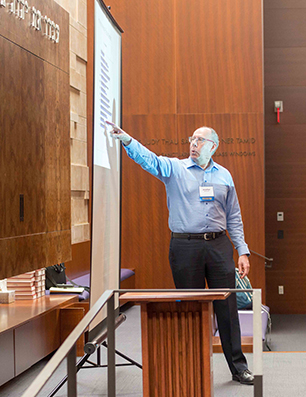
Word puzzles: training your brain and building new business skills

Jonathan Berkowitz is a lecturer in the Operations and Logistics Division at UBC Sauder who teaches statistics. He’s also ‘The Word Guy’ on CBC Radio. As a regular guest on the North by Northwest program, he delights audiences with his knowledge of the English language, word play, and word puzzles. He recently produced a book on the subject, titled The Whirl of Words: Puzzling Past and Present.
For some, word puzzles are one of life’s simple pleasures. They make commuting on public transit more enjoyable and waiting at the doctor’s office less tedious. They engage our senses and distract us from nagging thoughts. And as Berkowitz’s students will attest, word puzzles also help the brain interpret data.
In The Whirl of Words, Berkowitz explains how crosswords, riddles, anagrams, ciphers, and the like activate the analytical centres of our brains and fill us with joy when we crack the code and discover the answer.
"I've always been fascinated by our English language and how it all fits together,” says Berkowitz. “Some people like to take apart appliances or cars and then try to put them back together. I do the same, but I do it with words. I recognize patterns, I pick words apart, I look at their usage over the years. I also enjoy the humour that comes out of language and the different lenses through which you can look at words and their role in language."
Seeking logic in language
How a statistician developed a profound love of words can be explained in part by Berkowitz’s upbringing. His father introduced him to Scrabble at a young age, unlocking a knack for spotting patterns that lurked behind words and their formations.
"My father was a brilliant man with a huge vocabulary. But it wasn't very long until I could beat him at Scrabble because I could rearrange letters with ease. I could see different ways of placing the letters and pretty quickly learned different strategies to score high points," he recalls.
There were other moments in early childhood that amused his family. While Berkowitz's playmates enjoyed collecting plastic dinosaur figurines, he wanted to master spelling the names of the different types of dinosaurs … backwards.
Where others saw chaos, Berkowitz saw patterns. Perhaps it wasn’t surprising that his passion for solving word problems would lead to a career in the collection, interpretation, and presentation of data.
"Statistics is all about looking at patterns. So, if you're looking at graphs, you're trying to recognize the peculiar aspects and interesting features of it. How do you see the whole forest, and not just the individual trees? It's all pattern recognition," he says.
Feeding the brain’s natural curiosity
In his book, Berkowitz's narrates the history and evolution of word puzzles, how they unlock our critical thinking skills, and how they provide more depth to geography, literature, sports, and popular culture. As he explains to his students, the ability to detect patterns is a hallmark of intelligence, which is why he enjoys challenging students with pattern recognition and wordplay. It also makes his classes more fun and importantly, memorable.
"Before entering my class, some students have preconceived notions that statistics is going to be dry and mathematical. My approach to teaching is that if you can laugh, you can learn. So, I educate and entertain at the same time. And there are things that will stick with them because I’ve incorporated wordplay."
Berkowitz gives the example of how he turned the technical term – statistically significant – into wordplay that the brain will remember. "I tell my students there's a meaning of 'significant' that no other professor will teach you. It means 'power of attorney'," says Berkowitz.
He then proceeds to break down the word into four pieces: Sign-If-I-Can't.
"And I see the smile on their faces and in that instant, I know that they've got a hook to a statistical concept that they're going to remember. "
Berkowitz says a good wordplay can also infuse confidence: “With wordplay, Sauder’s assured,” he chimes enthusiastically. “Now rearrange the letters of ‘Sauder’s’ … and you get ‘assured.’”
Introducing students to the joys and business benefits of word puzzles

Berkowitz says UBC Sauder students can experience a host of benefits if they take an interest in word puzzles. Specifically, puzzling invokes lateral thinking and creative problem-solving; both are useful skills in the world of business.
"If you only ever see things the same way, you're going to come to the same conclusion every time. But innovation and creativity in business require that you go sideways too," he says.
"There's another aspect where puzzles overlap with problem solving in business and that’s asking the right questions. If you can learn to ask questions, then you can learn to solve problems. Both in life and in commerce, we have this urge to know. And solving puzzles allows us to get at the answers."
In a business world that demands workers be problem solvers, the 250-page The Whirl of Words offers plenty of puzzles to sharpen one’s brainpower. It also offers the promise of potentially becoming the undisputed word champion of family game night.